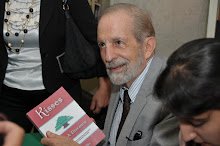Most people don't take note of the
trickery used by media "experts" when expounding on their latest
political prognostications. What these so-called experts do could be classified
as sleight of hand as they try to recover from their latest erroneous pontifications.
In the cool light of day, these seers do a great job of predicting the past.
They are so often wrong that fulfill the requirement for the logical fallacy of appealing to
misplaced authority.
But the tactics these
"pundits" use are mostly overlooked as they get listeners to accept a
host of "facts," as if they are uncontested truths. These axioms usually buttress their latest prognostications. Take as an example the run-up to the ill-advised
Iraq war. Just about every assertion of its merits was preceded by a
discussion of the possession of WMDs—until it was universally accepted by the listener
that just having such instruments of annihilation was ample cause for preemptive
war. And, even though most "experts" have been duly castigated for leading
us into an unjust and now protracted conflict, the notion remains that if Iraq had
WMDs the invasion would have been totally justified. The outcome, unfortunately,
would be just the same. We'd still be mired in an intractable never-ending conflict,
WMDs or not. Also, no one seems to want to discuss the fact that many countries
(especially the US) possess such weapons and we have no interest, stated or implied,
to invade them. In other words, that justification is so totally subjective as
to be entirely false.
Another example of this hewing to
a false narrative occurred when John McCain was running for president in
2012. At one of his campaign stops, a lady said she didn't like Obama because
he was an "Arab." McCain got huge plaudits for taking the mic and
announcing that Obama wasn't an Arab but a decent family man. What was left
hanging in the air was the notion that being "Arab" would be a legitimate
disqualifying factor. McCain should have pointed out that in our country the
election of any candidate for any office does not require an ethnicity litmus test.
His response was hardly deserving of the accolades he received.
In the current presidential campaign
we are continually reminded that Hillary Clinton is the most experienced
candidate in the running. She has this fantastic resume that includes first lady,
senator and secretary of state. Implicit in this largely uncontested statement is
that the mere holding of high positions qualifies one as having great
experience. Compare this with George W Bush's resume, a man who widely ranks
among America's worst presidents. He was elected Governor of Texas, and president,
twice. I doubt the same people who tout Hillary's "experience" would
cede that W is more qualified simply by virtue of positions held.
Vastly more important than one's resume is a their performance in those jobs. And a closer look finds Hillary
Clinton's accomplishments to be quite lacking. Even while first lady, Hillary
insinuated herself in her husband's decision making, and she often got it wrong. Thus it
is fair to hold her accountable for the crime bill that her husband signed, which caused a 60% upswing in
incarcerations, mostly of the nation's non-white minorities. Add to that the
debacle on Wall Street following repeal of Glass Stegal—which led to the nation's worst
economic meltdown in history
As we well know, Senator Clinton voted
for the Iraq War—something she now admits was a mistake. However, when she was
running in 2008—nearly seven years later—she defended that decision. As
secretary of state, Clinton seemed to revel in her globe-hopping as if the
number of frequent flyer miles and capitals visited qualified as "great experience." In fact,
she had no positive effect on the situation in Iraq or Afghanistan, despite the chilling experience of
"running for cover" from a mythical attack after landing in Bosnia.
She vigorously supported the deposing of Syria's Assad and for providing military aid to questionable
rebel groups. Her emails clearly reveal that she was more intent on following Israeli
policy and having the country become fragmented. This strategy
resulted in thousands killed and created millions of refugees who are now inundating
Europe.
Clinton's adventures in Libya reveal a woeful
misunderstanding of the dynamics of that country's uprising, and her meddling
has left yet another failed state in her wake—with the concomitant number of
fatalities and emergence of terrorist groups.
So, should we accept the prima facie
notion that this candidate has great experience—as the media would have us do?
After all, the pundits know what they're talking about—don't they?





